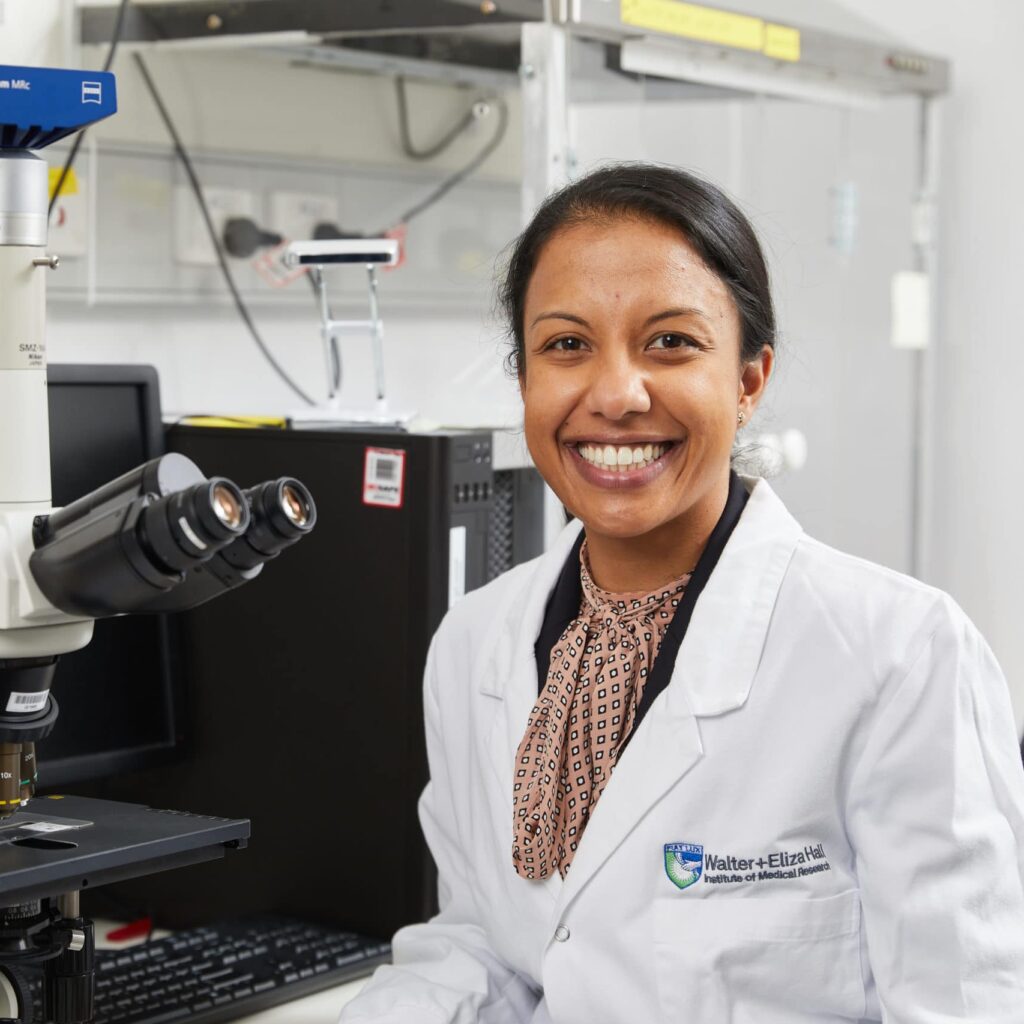The BRCA-P Prevention Study
At least one in 400 women in the developed world carries the hereditary BRCA1 gene mutation. This mutation is associated with approximately 70% risk of developing breast cancer and 40% risk of developing ovarian cancer over the course of a lifetime. The BRCA-P clinical trial is a preventative trial which is testing the effectiveness of a drug called denosumab in preventing breast cancer for these women.
Dr Christine Muttiah is a medical oncologist at the Peter MacCallum Cancer Centre and Royal Melbourne Hospital and is also working in the breast cancer lab at the Walter and Eliza Hall Institute of Medical Research in Melbourne.
As part of a Clinical Fellowship project with Breast Cancer Trials, Dr Christine Muttiah is aiming to assist in the clinical conduct of the BRCA-P study in the hopes to increase recruitment across all 14 Breast Cancer Trials BRCA-P sites.
“So, I have two projects as part of the Breast Cancer Trials Clinical Fellowship. The one I’m working on at the moment is related to the BRCA-P prevention study. So that study is an international study looking at the use of a medication to prevent breast cancer forming in women who have a gene mutation.”
“The research came from the lab here in WEHI to establish that international study. So, it’s really exciting to be part of that at Royal Melbourne and Peter McCallum Cancer Centre. But my project is focused on helping Breast Cancer Trials to increase recruitment to the study at all sites across Australia, and sort of be a central point of contact for any women who might be interested in the study.”
Listen to the podcast
Listen to our conversation with Clinical Fellow, Dr Christine Muttiah, as she discusses her research project which is focused on increasing recruitment to the BRCA-P clinical trial.
The Importance of the BRCA-P Trial in Opening Up a New Treatment Opportunity
“Generally, women who have been found to carry a BRCA1 mutation are seen in surveillance clinics. They might see a breast surgeon or a breast physician where they would get examinations and breast imaging every year, and also have discussions about how to reduce their risk of developing breast cancer.”
“So currently the most effective way of reducing the risk of breast cancer is to have a prophylactic mastectomy, but obviously that’s not for everyone. So that’s where discussions about prevention such as this clinical trial is important. And those discussions generally happen in very busy clinics.”
“So my role I guess is to take some of that burden off local clinicians and have those discussions with women.”
“Covid-19 and lockdowns have also created additional challenges, impacting recruitment levels for the BRCA-P clinical trial. I think recruitment to BRCA-P study hasn’t been as quick as we had expected, and I think that’s partly too because of Covid-19 of course. But also, you know these are well women who come in for their surveillance appointments once a year. So, we have a small window to discuss potential trials.”
The Benefits of Centralised and Accessible Recruitment
“I think the benefit of having this centralised process is that I know the study quite well and we’ve been quite successful here at the Peter MacCallum and Royal Melbourne in recruiting patients.”
“So hopefully having that discussion with one person, I guess just to find out more without having to commit should hopefully ease any anxieties people might have about the study.”
“So, for prevention studies looking at centralising recruitment might be something that helps Breast Cancer Trials in the future, particularly in studies such as this where we’re trying to recruit a large number of women to an international study. So hopefully the successes of this centralized process will give us more information about how we can reach all women in Australia and New Zealand to give them access and opportunity to be on a breast cancer trial whether it’s therapeutic or prevention.”
“Hopefully more information in the community will make it less dependent on that one clinic appointment, and it can be something they can access anytime.”
Being Involved in a World-First Clinical Trial
Dr Muttiah discusses the hope that women feel that they are involved in a trial that could potentially change treatment options for future generations who carry the BRCA1 gene mutation.
“Here at the Peter Mac and Royal Melbourne we have about 20 or more women who are part of the BRCA-P study. So being part of the BRCA-P study has been really important to them because unfortunately they’ve been impacted by close family members who have had cancer diagnoses due to the hereditary nature of the gene mutation.”
“For the women on the BRCA-P study, participating gives them hope that they’ll be able to hopefully change the future for their daughters, nurses, and their granddaughters. And so the women on the study are really enthusiastic about contributing to research and promoting the study.”
“I think that’s a really positive thing to hear from these women.”



